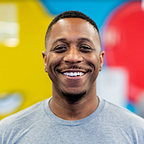An Unforgettable Day in America
What happened one year ago on this day is impossible to forget.
I stood proudly next to Mayor Lori Lightfoot to announce the launch of the Chicago PPE Market powered by my company, Rheaply. This marketplace had the potential to help solve a critical business and public health issue: helping small businesses and nonprofits find the necessary PPE for a safe reopening.
My small startup had been called on by the Mayor to solve an important issue during a growing global pandemic. And I, a Black man, stood next to a strong Black woman mayor in a press conference announcing a technology partnership to fight back the realities of the COVID-19 outbreak. As you can imagine, I was freaking out.
This was going to be an incredible moment for my company to live out its values and help our city. This was going to be the moment when many people for the first time might hear the name “Rheaply,” so I was pumped up for the launch. But my press conference with the Mayor isn’t what stands out in my memory from this day. It’s what happened just before that I’ll never forget.
Before my prepared remarks about the Chicago PPE Market, Mayor Lightfoot and her team gave updates on the status of the COVID-19 outbreak in Chicago. This was done with a bit of urging, caution, and the hope that a city needs to hear and feel in a moment like that. And then, tucked back behind her prepared notes, the Mayor pulled out a piece of paper that appeared folded and as though it had been drafted at the last minute. I could see that it was mostly handwritten, and for some reason, that got my attention.
Her emotion and tone devolved quickly, even more solemn and deliberate than before. Mayor Lightfoot took a breath, and then started to recount what we now know to be the story behind the death of Mr. George Floyd.
Just before the press conference started, I was instructed by the Mayor’s team to stand straight, wear my mask, not touch my face, and not move until my turn to speak had come. You don’t want to be a distraction in the background while the Mayor gives an update about how a global pandemic is affecting the city you love. But that was impossible. As I heard the Mayor, slowly and painfully, describe how this Black man had died the evening before; how it, again, involved a white cop; how Mr. Floyd’s encounter with the Minneapolis police didn’t give credence to deadly force; and how as a Black American she was saddened by these events; I, as a Black man, stood up straight but was on fire.
I couldn’t believe the story she was telling, I just couldn’t. I wanted to cry. I wanted to touch my face. I wanted to move so much I started to shake. And, then, I looked up and saw an audience of cameras and microphones and remembered the earlier instructions. So, I took a breath, stood tall and confused and angered, and silently carried on.
When my time came to speak, I walked carefully to the lectern and with a very stale smile, announced how Rheaply would help the City of Chicago with PPE sourcing. I had memorized the speech but needed my notes more for emotional grounding than for script. I remember trying to project the confidence of a strong Black man but internally I was confused, angered, and weakened.
After the press conference, I took a rideshare home and spent the 10-minute commute reading every article I could about what had happened in Minneapolis to Mr. Floyd. Everything that the Mayor had recounted was littered about in every news article I consumed.
By the time I was home, I realized that while many things were different, so many things were not. Different: I, as a Black man, had stood next to the Mayor of Chicago to announce something of importance upon which I knew we would fully deliver. Not different: Another Black man lay dead in an American street at the hands, or in this case, painfully, under the knee, of a white cop. Not different: I had many things to say and yet, I couldn’t.
I’ll never forget this day in America.
Now, a year later, I wonder what is fundamentally different. Have we implemented changes that would decrease the likelihood of another George Floyd moment? Have we made it easier for a Black American, in power or close to it, to speak their minds? Have we tried to actually empower more Black Americans?
As a society, we must not forget these moments but use them to construct a more just society. Above all, it instructs us to ask a simple question that measures progress: are things really different?
